Clem Burke in depth
Blondie drummer on legacy, the new album, Eurythmics, Ramones and more
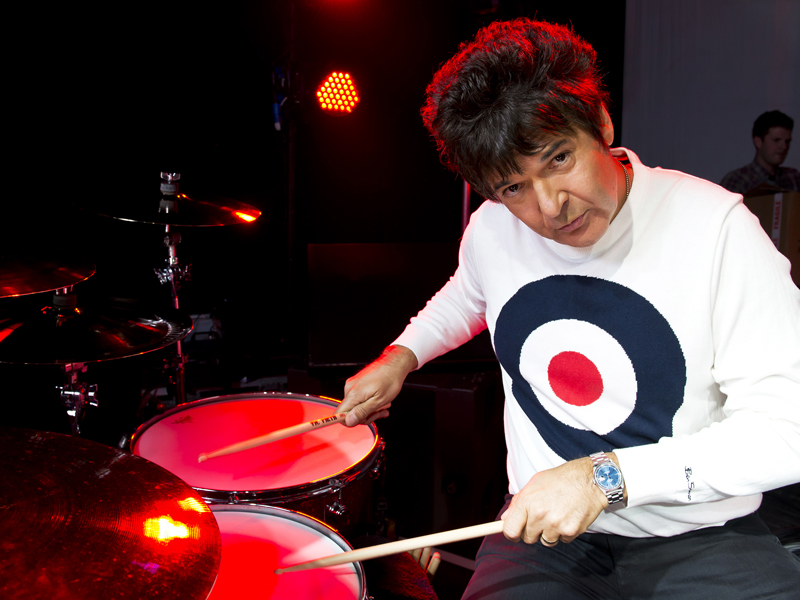
Clem Burke in-depth
Clem Burke will always hold a special place in the hearts of British drummers.
Though he and his band, Blondie, came out of the super-cool underground music scene that centred on New York’s CBGBs club in the 1970s, it was British audiences who most readily embraced the band’s sound and aesthetic.
And as a self-confessed Anglophile in love with the drumming of Keith Moon, even down to playing a Moonie-style red sparkle Premier with Blondie, Clem has always repaid the Brits’ love in kind.
This year Blondie began gearing up for an exciting year – their 40th anniversary year. In March they guested at the SXSW festival in Texas, and they have just released a brand new album, Ghosts Of Download, packaged together with an album of re-recorded greatest hits as Blondie4(0) Ever.
Not to mention they’ve just nailed their slot at Glastonbury. When we spoke to Clem for this interview, he and the band had just been awarded ‘Godlike Genius’ by the NME. Not bad going, eh?
“It’s really funny!” says Clem. “It’s good, I mean it’s interesting. I think maybe Dave Grohl was the only other American artist who’s got it and Debbie’s the first woman to have gotten it, along with the band. But it’s thrilling, you know?”
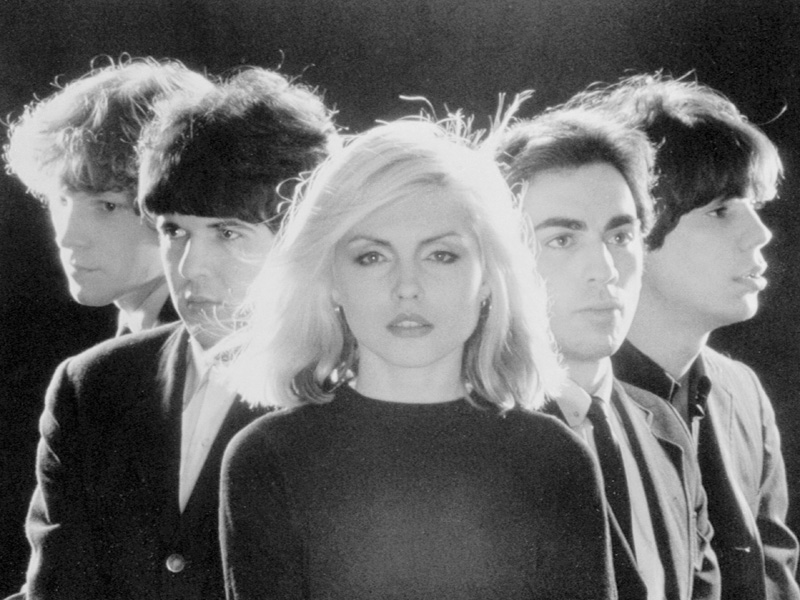
Clem Burke in-depth
It must be nice being recognised in that way for your contribution to music?
“It has to do with the longevity, because we’vehad our ups and downs with the British press, as probably most bands have, and I think it just enhances the legacy of the band. A lot of the things that we got [criticised] for, for instance doing a so-called disco song, it’s all become common-place now.
"A lot of the things that we got [criticised] for, for instance doing a so-called disco song, it’s all become common-place now"
"We were innovators in that sense, we took chances. The band was always about that because our influences were so all over the place, it wasn’t just punk rock. It was all assimilated into the sound that became Blondie and that’s what made us unique.
"Our influences were all over the place, whether it was country and western or Italian movie soundtracks, Russian ballet… you never know where the influences are coming from. I’m more of a traditionalist, I’m the first one to say it, I’m a rock’n’roll enthusiast and we still have the roots of rock’n’roll in our sound.”
It’s a big year for Blondie, with the band now celebrating 40 years. Did you ever imagine you’d reach that landmark with the band?
“I thought I’d be retired by the time I was 30, to tell you the truth! The band stopped when I was 27…I started the band when I was 18, you know? Obviously I went on to do other things. Ringo Starr wanted to open up a beauty salon, didn’t he? He thought that it would have been over in 18 months and he could open up a barber’s shop or something, so you never know… but we’re in it for life now obviously. Right now it’s all full-speed ahead. We’re going to continue into 2015 for sure.”
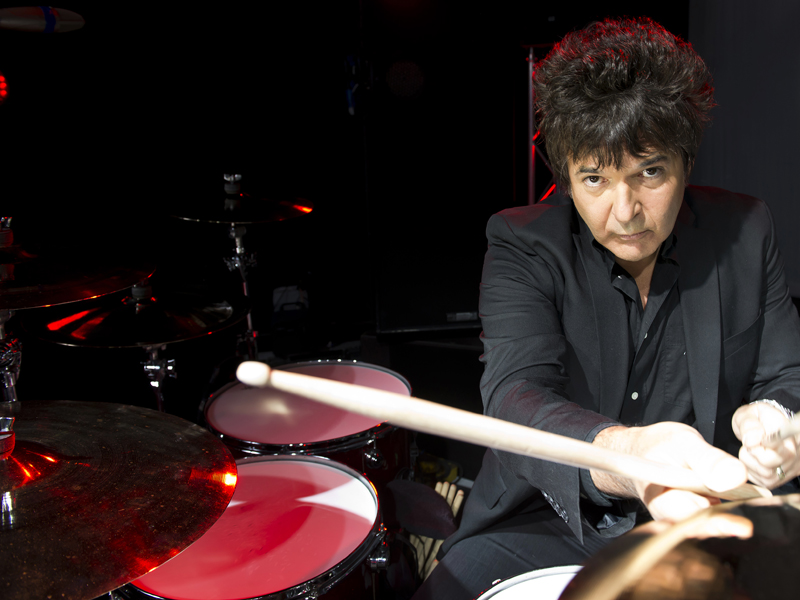
Clem Burke in-depth
Tell us about Ghosts Of Download. What can we expect from the new songs, drumming-wise?
“There’s a lot of programming, which isn’t really my favourite way of doing things. I recorded most of my drum tracks in a studio in Oakland, California. It was without the rest of the band being there, it was kind of interesting. We’d already pre-recorded programmed tracks and things like that.
"The songs have developed quite a bit since the recording of them, it’s almost like we wish we could go in and re-record the songs now. Especially the ones we’ve been doing live, they’ve evolved considerably in the arrangements and in the performance. That’s always the way, isn’t it? Especially today, people coming with programmed tracks and pre-recorded tracks, there isn’t that much room for conversation in the studio – which I really don’t like.
"I prefer to sit around in a circle with people and exchange ideas, routines and songs. We didn’t really do that on this record, we did it in rehearsals and the songs have evolved since then.”
For the new material, were you part of the writing process from the start?”
“On this particular album it all sort of came to me in this internet age that we live in. I was just getting bits online and processing them and going in and recording my bits and sending it back. Not my favourite way of doing things, for sure.”
You don’t use electronics live much do you?
“No. The drums are just tuned really well, and my tech does an amazing job tuning. I tried using completely triggered drums at one point, but I went back to acoustic drums, I’m much more happy with that. Fifty percent of the set is with a click track and 50 percent isn’t.
"I don’t really mind, I like playing to click tracks. It’s just the process, the way things are done. In the live set you need to play to a click track, play samples obviously. We’ve always done stuff like that.
"When I played with Eurythmics, nothing used to be tracked, nothing was programmed. The bunch of years I did with them, the keyboards were all played by a keyboard player. Everyone was just in sync – amazing band and players. The new Blondie band is an amazing band too.”
So you’re a traditionalist at heart?
“I’m happy using electronic drums in the mixes, but you know, going back to The Eurythmics I was using a Simmons kit in conjunction with my acoustic kit and on ‘Heart Of Glass’ I was using a drum machine and it’s just a continuation.
"I like to use exclusively acoustic drums, rock’n’roll drums on my other projects – like I have a band with Glen Matlock called The International Swingers, we’ve just been in 606 Studio, Dave Grohl’s studio that he builtwith the Neve board from Sound City. I went to see that young band, The Strypes, and they’re just completely organic kids that play really well. I prefer to do things like that, that’s the kind of music I listen to.
"I don’t like programmed synthetic music that much. But having said that, with the Blondie stuff between Debbie’s vocals the strong melodies come out. It still very much sounds like Blondie. The new material is just to keep things fresh and to keep making your music.
"We never really fancied just going out and playing the hits. [When] we got back together in 1999 it was important for us to make the No Exit record and collaborate a lot.”
The drumming you’re known for is somewhere between Keith Moon and disco, so especially with the dancier beats, at what point did you feel that you had to work with a click?
“Heart Of Glass was played to a drum machine. I can’t really say when I began to do that [use click], it might have been with Eurythmics in the mid-’80s when we were recording Revenge.
"I never played to a click in the studio with all the Blondie stuff. It’s not a strictly regimented thing. For younger players, a click track is like a guide. You don’t have to be precisely on the click the whole time unless you’re playing some sort of straight, quarter-note disco rhythm.
"The rhythm can be moved around a little. If you’re off the click by a millisecond it doesn’t really matter that much, I wouldn’t really stress out about playing to a click track. Use it more as a tool or a guide, another instrument to play along to.”
What differences have you found in the way you work in the studio now?
“It’s probably just more matter-of-fact. I’m involved in a bunch of different projects, the one with Glen Matlock and another project is with [The Cars’] Elliot Easton called The Empty Hearts and we’ve just done an album that’s coming out August 5th worldwide through 429 Records/Universal.
"The Empty Hearts consists of myself, Elliot Easton, Wally Palmar from The Romantics and Andy Bubiuk from The Chesterfield Kings. You may know Andy from his two books, Beatles Gear and Stones Gear. I’m very excited and proud of my playing on this record. Ed Stasium [Ramones, Living Colour, Talking Heads] produced and Ian McLagan from The Faces plays keyboards.
"No click tracks were used at all, it was actually a mandate from the producer that we didn’t use click. So, recording was really just more matter-of-fact. I’m used to doing it, I was never really intimidated by the recording studio.
"I was lucky to work with some really cool producers, especially Richard [Gottehrer] our original producer for Blondie. He would make an effort to make certain things perfect and other things wouldn’t be as perfect which was good, it gave you room to kind of express yourself, experiment and kind of move things around a little bit.
"You’ve got to have that sort of outlook and attitude in the studio. It shouldn’t be when you feel like you’re under a microscope, a real oppressive situation. Just enjoy being there, and the process.”
Are there any tracks that you’re particularly happy with in terms of the drumming?
“The whole album. I still want to make Parallel Lines 2. Go into the studio and just full-on record everything live. There are no rules really nowadays, there are so many ways of doing things. I would like to do something like that with this band that we have now.
"But I’m happy with the album. I’m happy that it’s coming out, it will be good just to have some new Blondie music. It always goes back to when we first got back together, the priority was to make new music.
"So I don’t think we’re really searching for that elusive hit record, I think we’re just happy as artists to be able to make new music and that’s really what the record’s about.”
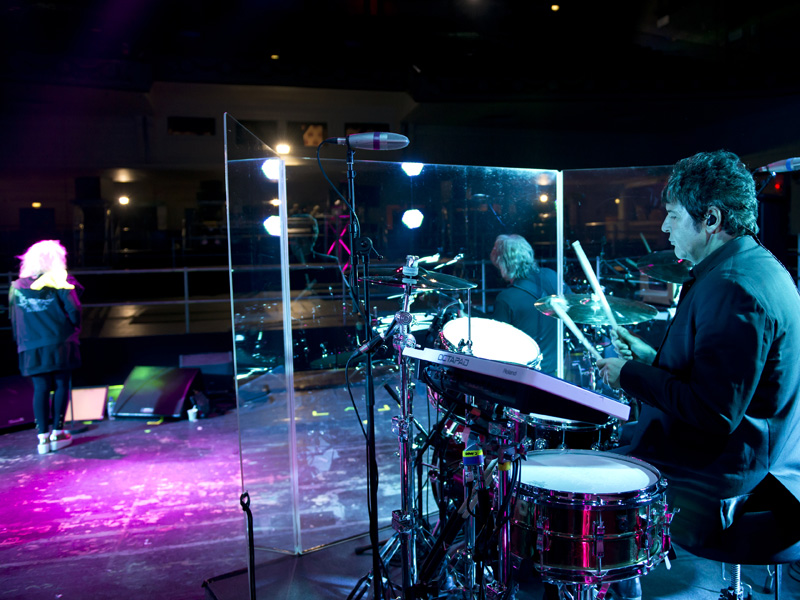
Clem Burke in-depth
Do you always try to stay true to the band’s legacy or try to move things forward?
“On this album, we’re experimenting with some Latin rhythms. We kind of touched on them onthe last album; I think there was one Latin-influenced song. We’re experimenting withrhythms that way and I guess the band as a whole doesn’t like to do the obvious, [instead] do the unexpected.”
So can you see the band making a Parallel Lines 2 at some point?
“I have a feeling we’re going to get closer and closer to that, because the band is ready to do whatever comes up almost at the drop of a hat –the band’s playing great. And the young guys in the band would like the chance together to do that in the studio, and that’s one of the things that has been acknowledged with us getting this award from the NME, that our years of touring the UK have paid off and people realise we’re a great rock’n’roll band.”
Going back 40 years then to when Blondie began, the band weren’t taken seriously at first by a lot of the other CBGB scenesters, were you?
“I think we were taking it seriously. Part of the music we played was probably considered the hippest way to go. I got a bit of a reputation for being a fairly good drummer, I’d been playing since my very early teens and during that time I got offers to go and play in other bands.
"I had a belief in Debbie and Chris as artists; Debbie’s stage presence. What they were doing was sort of American bubblegum music; we always walked a tightrope between art and the underground and commerciality.
"In the infancy of the band it was still kind of like that. Gigs that no one else would play, we played in Central Park on New Year’s Eve in 1974 and it was extremely cold but it was like a party in Central Park. We played at this after-party for the equestrian show in Manhattan. The gigs that we were playing weren’t getting us commercial success.
"There was an aesthetic that we didn’t conform to and we had our own way of looking at things and we kind of persevered that way"
"There was an aesthetic that we didn’t conform to and we had our own way of looking at things and we kind of persevered that way. In CBGBs, we weren’t the kind of music that went on there, [but] we kind of carried the CBGBs torch. We weren’t influenced by The Ramones, Television and people like that but we assimilated that stuff into our sound in a lot of ways. Talking Heads, and things like that.
"We were taken seriously because we got a record deal quite early on. We were able to play all the hip clubs in New York but we weren’t the hippest band in New York. The great thing about being a musician is that as you go along, you continue to play. That was kind of the deal.”
Do you think your commitment and desire for success at the beginning helped?
“Yeah. We were writing the songs collectively. I definitely had a desire to be famous, more so than to be rich. The money comes so much later than the fame. I think Debbie wanted to be acknowledged. It was such an adolescent attitude.
"We all had that in us a bit. Chris said he just went day to day and didn’t know what would happen. I had a desire to be a pop star – more so than to be a great musician, that’s for sure.”
What were the main inspirations for the parts that you created in those classic Blondie songs?
“Top 40 radio in the US, The Four Seasons, The Young Rascals, The Beatles, The Raspberries. I like American bubblegum music as well. The bands I was seeing at CBGBs, The Ramones and Talking Heads were all very influential. Hal Blaine and Earl Palmer, I was very aware of those names from early on as great session musicians in the ’60s and they did all the American hits between them.
"All that stuff is great music to me and I was great friends with Earl Palmer. I did an interview with him for Rhythm way back when. Al Jackson, Keith Moon and Ringo Starr, I always liked their styles. And of course there’s Hal as well. I played at Hal’s 80th birthday party, it was great.”
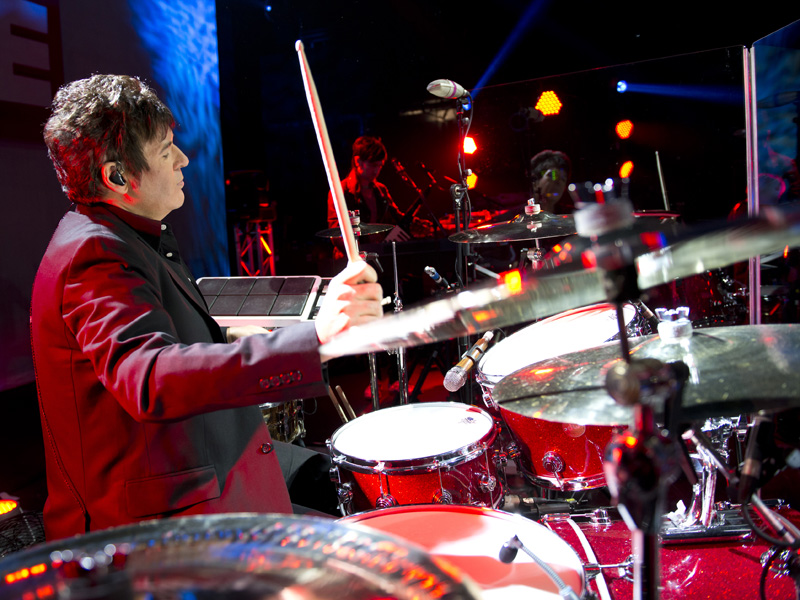
Clem Burke in-depth
With ‘Heart Of Glass’ did you set out to mix disco and punk rock in the way that you did?
"One of the inspirations for ‘Heart Of Glass’ was Saturday Night Fever. They were all real musicians playing great grooves"
“The disco movement was just as outrageous as the punk rock movement. It was an underground music and came out of the gay clubs; it was even more subversive than punk rock. When I first met Chris and Debbie there was a place called Club 82, they would have rock bands one day a week and the other times it was a dance club and the music that they played was dance music.
"One of the inspirations for ‘Heart Of Glass’ was Saturday Night Fever. They were all real musicians playing great grooves; it’s not what it has become now. Abba was one of my favourite bands; one of the greatest concerts I’ve seen was Abba at New York’s Radio City, great musicians playing great grooves and great music.
"We all loved that kind of dance music, the influence of Chic on ‘Rapture’. What dance music has become is not really my favourite type of music because with programming it’s not about playing the groove, the groove is already established by the machine. With ‘Heart Of Glass’ we used the drum machine and incorporated it with the live drums.
“You’d put your most commercial songs at the front of the album so a radio programmer could put the needle down and it would be the first track. If he didn’t like what he was hearing first he wouldn’t programme the record.
"‘Heart Of Glass’ is buried in the album, so we weren’t trying to make this commercial dance record, we were just experimenting with a different groove and with machines and with synthesisers. The general public really took to it and that became one of the things that we’re known for, like my dance drumming.”
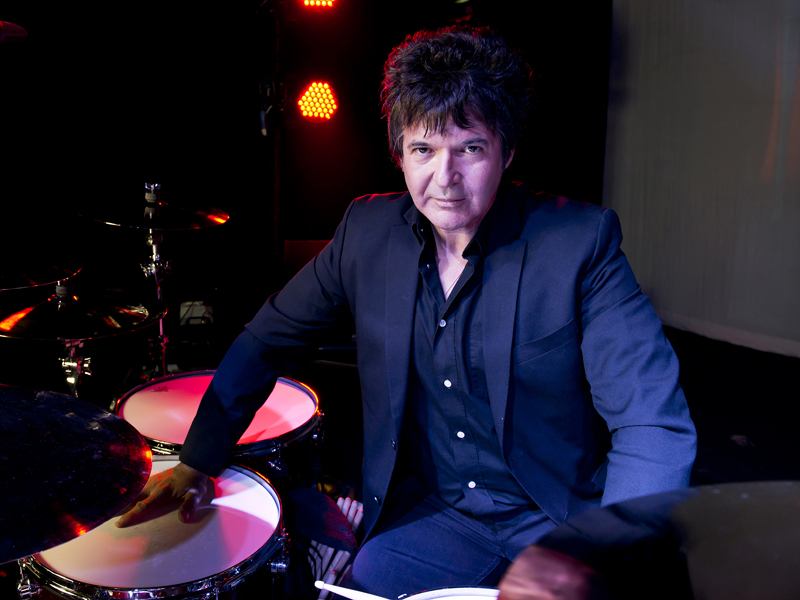
Clem Burke in-depth
Are there any drum parts that you’ve written that you struggle to play live?
“No, because I never really play the same thing twice live. I like to think that I don’t anyway. I look at the live performances as being in the moment, obviously you’re not going to play entirely different. I’m proud of what we’ve done and there aren’t really songs I don’t like to play.
"The live performance is all about audience response, they spur you on really, I think that’s true of any live performer. I’ve read that Springsteen will write a set-list then go out and do a completely different set based on his mood at that moment.”
What’s been your most challenging drumming moment to date?
“When I played with Eurythmics on the Nelson Mandela Concert [1988]. We had to get up really early, there was no sound-check and we were playing to 72,000 people. I was asked to bang on the drums as we came on stage for a check, I could see Richard Gere introducing the band, which wasn’t in my monitor system. I whacked the drums and he turned around and looked at me like the punchline of a joke or something.
"I played with Iggy Pop opening for The Rolling Stones on their 1980 tour. Once again, no sound-check to 50,000 people. It was like going into the coliseum with the roar of the crowd. Both my arms were covered in blood by the end from bottles being thrown and knives and money, just complete chaos. Those experiences are challenging because you’re like a sitting duck on stage.
"Both my arms were covered in blood by the end from bottles being thrown and knives and money, just complete chaos"
“As far as physically challenging, I have the Clem Burke Drumming Project and I’ve been made an example of for my athletic approach to drumming.
"I don’t really like to not be on my game when Iplay, I don’t like to be challenged. Younger players should enjoy the studio and not feel inhibited by the studio or like they’re under a microscope because it’s just about the creativity.
"If it’s hot and you’re tired that’s when it is a challenge to keep it together. Not to fly off the handle is a challenge sometimes [laughs]…”
What sort of things do you do to keep your stamina and fitness levels up?
“I train. I go swimming and do weight-training, I’ve also been vegetarian for about 30 years. I decided I wanted to be able to play as long as I wanted and that I would take a healthy approach to life in general. Back in the days when everybody was abusing themselves, I did my fair share of things.
I’ve seen lots of people’s careers being destroyed by drugs and alcohol. I detest drugs and I see what it does to people. There’s no way I’d be able to do this at my age if I didn’t pay attention to my health.
"The key to drumming is to continuously do it. I have all these different projects and I’m always on the road. One gig we did, me and the bass player played in both the opening band and the main band.
"I was playing for three hours and driving around in a van. It enables me to appreciate Blondie where we’re in five-star hotels and everything. I realise I’m living the dream and I love being on the road, we all get on well. Me, Chris and Debbie have done this thing for a very long time together. We’re proud of it.”
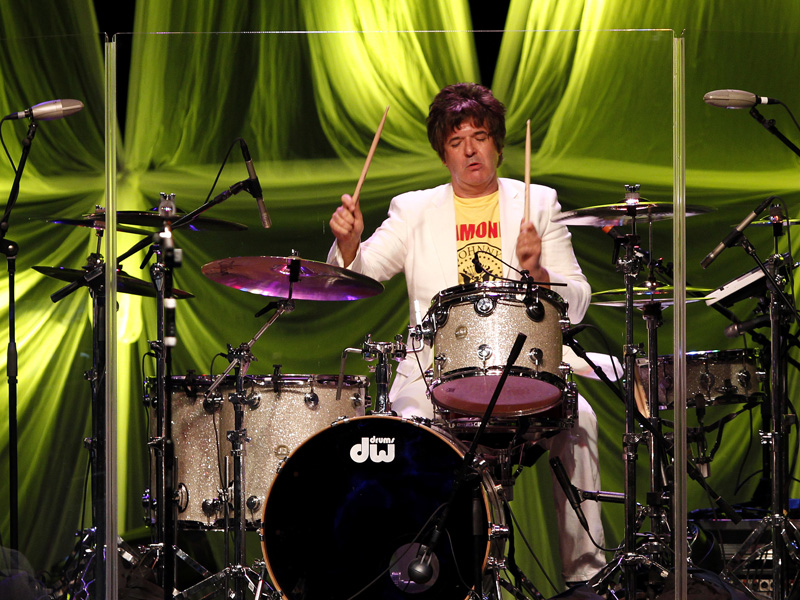
Clem Burke in-depth
There’s a BBC documentary about Blondie where Debbie says she wished she could put a brick wall around you. And your kit I notice still has that Perspex cage around it…
“I still have it, yeah. Whatever allows me to do this particular gig, and I think that’s an attitude that maybe comes with age – although I’ve always been open minded to whatever is come-up-with in the context of the band musically and philosophically over the years – it just has to be whatever makes it work for Debbie.
"I would prefer the singer to be in the box!"
"I would prefer the singer to be in the box! Drumming is a one-off thing, you’re an enigma in the band – it’s hard for the rest of the musicians to have that empathy with the drummer.
"There’s a cameraderie amongst drummers that isn’t experienced with any other instrument. But you’re working collectively with other people, you have to keep that in mind. When the thing came up about using the Perspex, we’ve had about a dozen different designs with it, I don’t like the ones that get scratched.
"I know Zak [Starkey] used one with The Who. Me being so handsome, you wouldn’t want a brick wall in front of me!”
Blondie aside, what’s been your favourite gig?
“Eurythmics. Dave Stewart and Annie Lennox were phenomenally talented, smart, nice people. It was really a great experience. I worked with them on the first album [In The Garden, 1981].
"I met Annie in a nightclub, all these people were in this club and a Blondie song came on. Annie came up to me. I had lunch with her and Dave, I did their first album with them and their first television performance. It was cool we had that relationship. It was good that they [then] had success with Sweet Dreams.
"We had a soccer stadium tour with Revenge, our relationship with them was good, it still is. I don’t play with anyone that I don’t enjoy working with, I have to enjoy the music. I like playing with Nancy Sinatraa lot. The ideal gig would be to play with Little Richard or Chuck Berry, or Bruce Springsteen.”
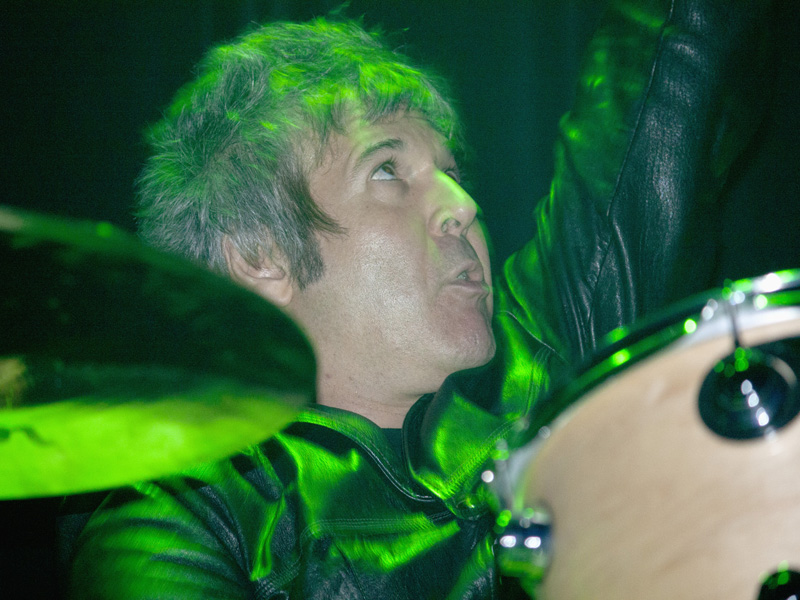
Clem Burke in-depth
And you were in The Ramones for a while too?
“I was good friends with Joey, I thought it would be pretty neat to be in The Ramones. We never rehearsed and they were all insane in their own ways and now all of them are dead.
"I thought it would be pretty neat to be in The Ramones. We never rehearsed and they were all insane in their own ways and now all of them are dead"
"I showed Chris a picture of us and he said, ‘You know what’s weird about that picture? Everyone’s dead but you.’ I’m lucky I survived The Ramones, they were a great band.
"Their influence was phenomenal. It’s terrible that they’re not around to enjoy the success because they worked so hard. It wasn’t really an enjoyable experience for me, Johnny and Joey didn’t speak, Dee Dee was addicted to drugs and I was in the middle of all that.
"They were my friends though, I knew what to expect. I would have liked to have rehearsed – I like being prepared. I’m the first one in a bar who will get up and jam with someone but if I was doing a show I should rehearse. I played along to the songs but we didn’t rehearse.”
Forty years is a long time to be in a band together… what’s the secret to longevity?
“Well, I don’t really look at it that way, I just always have been a part of it and when we started – to be honest the three of us are the ones that started it up and then I got my mate Gary Valentine on bass, we got Jimmy Destri on keyboards – but the band was almost non-existent, we kind of broke away, Chris, Debbie and myself, from everything that came after and it’s come full circle when the three of us remain.
"I don’t have any personal problems particularly, everybody has ups and downs in life but I don’t think anything affected me adversely enough to make me not want to do my job."
“Basically, play great, and that’s about it. I always go for it like it’s my last gig, I’m in the moment when I play, I’m not thinking about the shopping. It’s more than a job for me, it’s my life – at this point in life. I’ve heard that reiterated by Debbie and Chris many times.And we’re able to go off and do other things, I’m able to go off and play with all different artists.
"The most important thing to me is that I’m always able to be playing a lot, I’m not that big on practising on my own, I enjoy interaction with other musicians and playing with other musicians, and the camaraderie and the chemistry of working with people that are my friends.”